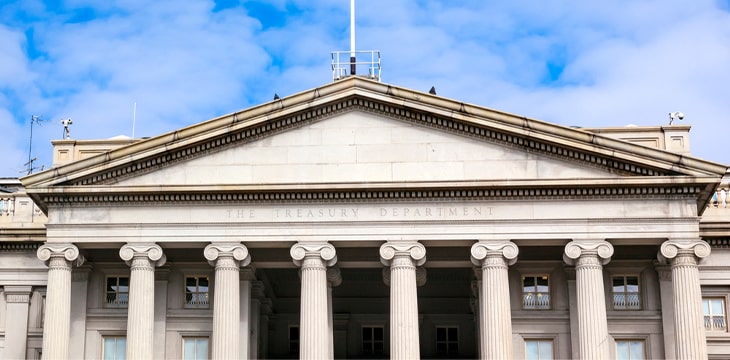|
Getting your Trinity Audio player ready...
|
Nerves have been on edge in the digital currency space ever since U.S. President Joe Biden’s Infrastructure Bill proposed new reporting obligations and taxes on ‘brokers’ within the industry. Biden’s Bill left the determination about who would be considered brokers to the Treasury, which has reassured a group of senators representing the industry’s interests that the Internal Revenue Service (IRS) will not consider miners, stakers, or coders to be brokers.
What did the Treasury say and to whom?
According to The Block, the Treasury wrote a letter to six ‘concerned’ senators on February 11: Cynthia Lummis (R-WY), Rob Portman (R-OH), Mark R. Warner (D-VA), Kyrsten Sinema (D-AZ), Mike Crapo (R-Idaho), and Pat Toomey (R-Pa.).
“Existing regulations impose broker reporting obligations only on market participants engaged in business activities that provide them with access to information about sales of securities by taxpayers,” the letter stated.
Naturally, coders, stakers, and miners wouldn’t have access to such information, so they aren’t covered by the regulations. This will come as a relief to many. However, there was an outcry when one of the draft versions of the Infrastructure Bill was proposed back in August 2021.
At the time, the six lawmakers outlined above argued that it was technologically impossible for miners, stakers, and coders to keep information on people for who they validate transactions. They also brought up privacy concerns. After some wrangling, the bill became law in November 2021.
While the recent Treasury letter is reassuring, it’s likely going to take the publication of formal guidance in black and white before the jitters finally settle.
So, who do the reporting obligations apply to?
The reporting obligations will apply to brokers, which are defined by the law as:
“Any person who (for consideration) is responsible for providing any service effectuating transfers of digital assets on behalf of another person.”
Senator Toomey called the language “badly flawed” and argued that it should be revisited. Indeed, it is an extremely broad language, and it’s easy to see why it initially caused some confusion and panic.
While it looks like miners, stakers, and coders are off the hook, the regulations almost certainly cover digital asset exchanges and platforms of all kinds. It will require them to collect and report information about digital currency transactions and trades. The rules are due to kick in starting the tax year 2023.
The walls are closing in on criminals and tax evaders
Obviously, these new rules will be a major concern for those who use digital currencies to avoid paying taxes and engaging in illegal activity. For those people, the walls have been slowly, but ever so surely, closing in. Soon, the narrative that digital currencies like Bitcoin are outside of the control of the law will be proven false.
For example, consider someone with a significant amount of value in digital currencies but never declare it to the IRS. Soon, as the unhosted wallet rule kicks in alongside these reporting obligations, they may find themselves unable to exchange or cash out their coins or to spend them in any significant amounts anywhere. If reporting obligations fall on wallet providers, they may find themselves unable to even move the coins without linking their identity to their wallets. You can imagine where this might lead.
Other regulations that will have a large impact are AML/KYC laws. We’re likely to see identity linked to wallets, or at least wallets with significant balances. Although these identities will not be publicly visible, they will be reported to tax authorities in the relevant jurisdictions. Regarding AML laws, we’ve already begun to see issues arising with so-called ‘tainted coins.’ The tweet below shows that some lending platforms are already refusing to accept coins they deem to have been mixed or used for potentially criminal purposes.
Another happy BlockFi customer. pic.twitter.com/ljwodJR4r0
— Bitfinex'ed 🔥🐧 Κασσάνδρα 🏺 (@Bitfinexed) February 5, 2022
Summary
While it’s common sense that miners, stakers, and coders should be outside the purview of the new regulations in the Infrastructure Bill, these and other similar regulations will significantly change the industry. They’ll drive out the underworld elements and those of an anarchist, anti-law bent. Finally, with them gone, enterprise uses and real utility can be built and fostered within the ecosystem.
Watch: U.S. Congressman Patrick McHenry on Blockchain Policy Matters with Bitcoin Association’s Jimmy Nguyen

 03-01-2026
03-01-2026 




